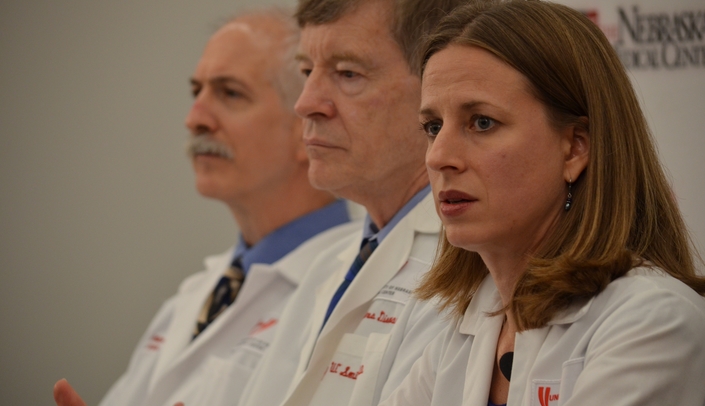The U.S. State Department has asked for assistance from The Nebraska Medical Center and the University of Nebraska Medical Center in caring for an American doctor who was working in West Africa when he tested positive for the Ebola virus.
Officials expect this patient to arrive in Omaha Friday morning and to begin treatment in the Biocontainment Patient Care Unit, located inside The Nebraska Medical Center.
"This unit was specifically designed to care for patients of this nature and is staffed with infectious disease experts who have prepared for years for situations like this one," said Phil Smith, M.D., medical director of the Biocontainment Unit.
"The unit is sealed, guarded and secure. It's separate from other patient care areas, and just like the facility at Emory University, which successfully treated two Americans with Ebola last month, we are uniquely prepared to handle infectious diseases here."
Along with the med center's 10-bed Biocontainment Unit, there are only three other similar facilities in the United States. The list includes the unit at Emory University in Atlanta that is operated by the Centers for Disease Control and Prevention, the National Institutes of Health in Bethesda, Md., and the Rocky Mountain Laboratory in Montana.
"We want everyone to know that every precaution is being taken in transporting this patient here and caring for them once they arrive," said Angela Hewlett, M.D., associate medical director of the Biocontainment Unit. "This is one of the safest places in the country for this patient to be treated, both for the public and for the medical professionals providing care."
"There are strict guidelines in place to ensure staff members who work in the unit are protected," said Dr. Smith, a professor of infectious diseases at UNMC. "Staff members have drilled on a routine basis to prepare for something like this since the unit opened in 2005.
“The unit is equipped with a special air-handling system to ensure that microorganisms don't spread beyond the patient rooms, with high-level filtration for additional protection. A dunk tank for lab specimens and a pass-through autoclave help assure that hazardous materials are decontaminated before leaving the unit."
"We understand that some people might have questions about why this patient is coming here instead of Emory, where the first two patients were treated," added Dr. Hewlett, a UNMC assistant professor of infectious diseases.
"We are doing this at the request of the U.S. State Department. The fact is, handling the Ebola outbreak is a marathon, not a sprint. We didn't request that a patient be brought here, but having the unique ability to care for this patient will only serve to build up our national resiliency in treating other similar patients in the future."
The unit has been activated once since it opened, for a case that turned out to be malaria. However, it is frequently used for training and as additional space for patients during times when the hospital is near capacity.
With a reputation for excellence, innovation and extraordinary patient care, The Nebraska Medical Center is ranked by U.S. News and World Report as one of America’s Top Hospitals in cancer, neurology/neurosurgery, pulmonology, gastroenterology, urology and nephrology. It has earned J.D. Power and Associates’ Hospital of Distinction award for inpatient services for six consecutive years and has also achieved Magnet recognition status for nursing excellence. As the teaching hospital for the University of Nebraska Medical Center, this 627 licensed bed academic medical center has an international reputation for providing solid organ and bone marrow transplantation and is well known nationally and regionally for its oncology, neurology and cardiology programs. The Nebraska Medical Center can be found online at www.nebraskamed.com
Through world-class research and patient care, UNMC generates breakthroughs that make life better for people throughout Nebraska and beyond. Its education programs train more health professionals than any other institution in the state. Learn more at unmc.edu and follow us on social media.
Twitter | Facebook | Pinterest | YouTube
UNMC Chancellor Jeffrey P. Gold, M.D., sent this message via email to the campus community on Thursday afternoon:
Colleagues,
I am writing to inform you that a patient who has tested positive for the Ebola virus is expected to arrive at our medical center tomorrow morning. The patient is an American physician who was working in West Africa when he tested positive for Ebola.
The U.S. State Department had asked for our assistance in treating this man, and we welcome the opportunity to care for this patient. As a leading academic medical center, our job is to care for the sickest patients. Our expertly trained health care professionals are ready to do so.
Our biocontainment unit, where this patient will be housed, is a safe and appropriate location for this patient. The patient’s presence does not put anyone outside of that unit at an increased risk for exposure. The unit is sealed, guarded and secure, and it is separate from other patient care areas. Ebola, while it has a high mortality rate, is not very contagious and cannot be spread through the air. It spreads only through direct contact with bodily fluids of infected people.
We firmly believe this does not pose a risk for the rest of our campus or to the community at large. Every safeguard is in place to protect our staff, our other patients and their families.
If someone asks you if they’re safe at our medical center, please reassure them they are. Share with them the points above – we are prepared to safely deal with situations like this.
Thank you all for the work that you continue to do here. I’m proud to be associated with our medical center, and I think you should be, as well.
Sincerely,
Jeffrey P. Gold, M.D.,
UNMC Chancellor
